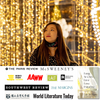Choose from 70+ workshops!
Find Your Workshop NowIndependent & Artist-Run Since 2016.

Classes Starting Soon!
Finding Your Voice Hawaii Island Writing Retreat, October 19th - 24th, 2025, Sign Up Now!


Finding Your Voice Hawaii Island Writing Retreat, October 19th - 24th, 2025, Sign Up Now!
The Secret Sauce: Writing Structure & Notecards for Memoirists and Nonfiction Writers 5-Week Zoom Intensive, Starts Monday, May 12th, 2025


The Secret Sauce: Writing Structure & Notecards for Memoirists and Nonfiction Writers 5-Week Zoom Intensive, Starts Monday, May 12th, 2025
Layering: A Structured Approach to Revision with Chaitali Sen 6-Week Zoom Workshop, Starts Tuesday, May 13th, 2025


Layering: A Structured Approach to Revision with Chaitali Sen 6-Week Zoom Workshop, Starts Tuesday, May 13th, 2025
Understanding Taiwanese Literature 6-Week Zoom Workshop with Jenna Tang, Starting Tuesday, May 13th, 2025


Understanding Taiwanese Literature 6-Week Zoom Workshop with Jenna Tang, Starting Tuesday, May 13th, 2025


